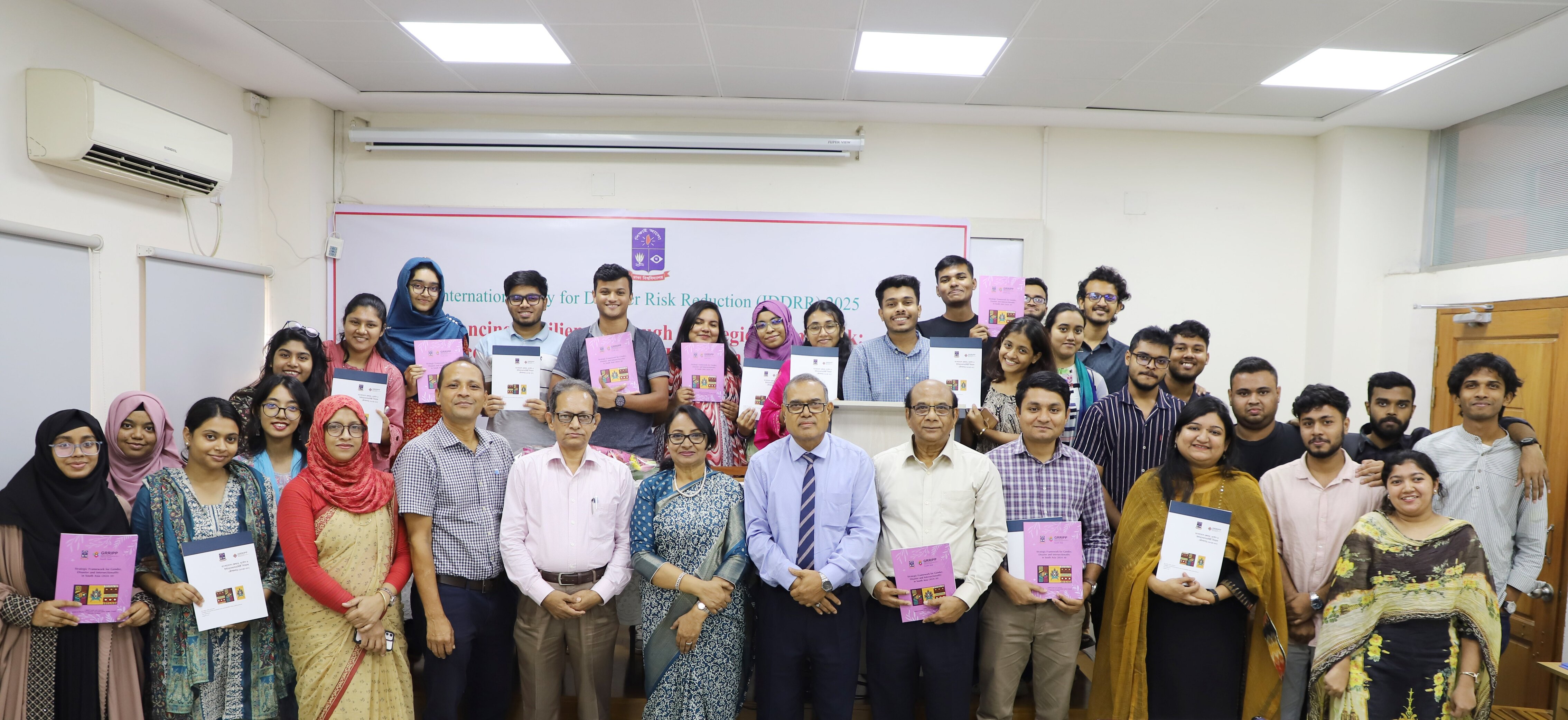
IDDRR 2025 Observation Summary by IDMVS
The Institute of Disaster Management and Vulnerability Studies (IDMVS), University of Dhaka, organized a seminar titled “Financing Resilience through Strategic Framework: Experiences from Gender, Social Inclusion & Intersectionality” to mark the International Day for Disaster Risk Reduction (IDDRR) 2025. The event aligned with the global theme of IDDRR 2025 to “Fund Resilience, Not Disasters”, while drawing on the knowledge and networks established under the recently completed Gender Responsive Resilience and Intersectionality in Policy and Practice (GRRIPP) South Asia project (2020–2024). The aim of the seminar was to validate this a Strategic Framework with all relevant stakeholders and to formally hand it over to the Government of Bangladesh for mainstreaming into national disaster management and development policies.
GRRIPP South Asia was a four-year global collaboration and knowledge-exchange initiative, launched in 2020 through a memorandum of understanding between the University of Dhaka, Bangladesh, and University College London (UCL), United Kingdom. The project was implemented by the Institute of Disaster Management and Vulnerability Studies (IDMVS), University of Dhaka, and awarded several research projects across Bangladesh, India, Nepal, and Sri Lanka. Using an intersectionality lens, GRRIPP South Asia aimed to bring together theory, policy, and practice to promote a gender- and social inclusion-responsive approach to disaster management and development. Based on the project experiences, a strategic framework for gender and intersectionality was developed for South Asia. In addition, IDMVS developed a national strategic framework for Bangladesh.
The seminar brought together representatives from the Ministry of Disaster Management and Relief (MoDMR), students of IDMVS, academia, development partners, private sector leaders, and civil society organizations. The discussion centered on the need for inclusive and intersectional financing mechanisms to strengthen resilience and risk-informed development in Bangladesh.
Professor Mahbuba Nasreen, PhD; who led GRRIPP South Asia, presented the Strategic Framework on Gender, Social Inclusion, and Intersectionality for Resilience Financing, highlighting its practical relevance in the upcoming National Plan for Disaster Management (NPDM) 2025–2030.
Distinguished discussants shared experiences from both local and regional perspectives, underscoring how gender-responsive, socially inclusive, and intersectional approaches can enhance the impact of disaster risk reduction investments.
Mohammed Moniruzzaman Khan, PhD, Director of IDMVS, University of Dhaka delivered the welcome speech mentioning that:
“Each year IDMVS observe the IDDRR in line with the theme of the day. This year is very special for IDMVS as we are officially handing over a Strategic Framework, developed over the four years, to the policy maker”
Mohammad Taher; Steering Committee member of Duryog Nivaran said,
“Mobilizing funds has become an increasingly critical challenge. Often, projects face obstacles not due to a lack of resources, but because funding is not pursued strategically. Our framework offers practical and realistic guidance to address these challenges through a thematic and systematic approach.”
Deputy Secretary and Gender Focal of the Ministry of Disaster Management and Relief (MoDMR) Sanjida Akter said,
"A team is already collecting field information to draft the new version of the NPDM. In disasters women, children, the elderly and persons with disabilities suffer the most, which aligns with the objectives of the GRRIPP project. I urge that the plan identify the problems of these affected people and include ways to resolve them."
Professor Dr. Khondoker Mokaddem Hossain, Pro-Vice Chancellor; Bangladesh University of Professionals (BUP) and founder of IDMVS stated,
"Private sector participation is essential for implementing the strategy. I recommend linking it with the Disaster Management Act, the Standing Orders on Disaster and the NPDM, and I call for recognition of the private sector as one of the sectors vulnerable to disasters."
Mr. K.M. Abdul Wadud, Additional Secretary of MoDMR shared,
“Our objective is to integrate this strategy into the upcoming version of the National Plan for Disaster Management (NPDM). The issue is not the lack of funds, but rather ensuring that available resources are utilized effectively.”
He further noted that the ministry has undertaken an initiative to enable each ministry to mobilize and manage its own funds for disaster response. In his concluding remarks he said,
“This strategy, along with the related policies and plans, belongs to our nation. Their development and implementation demand a shared commitment and collective effort from all stakeholders.”